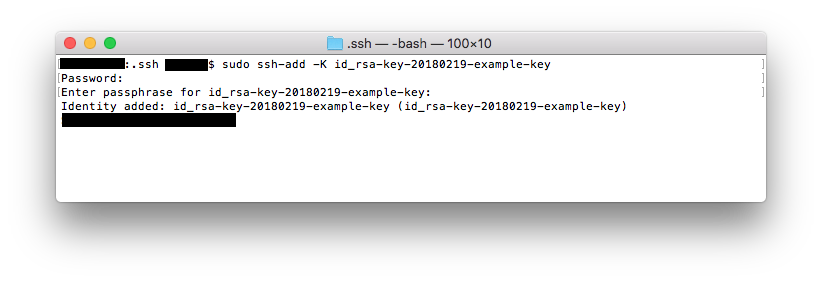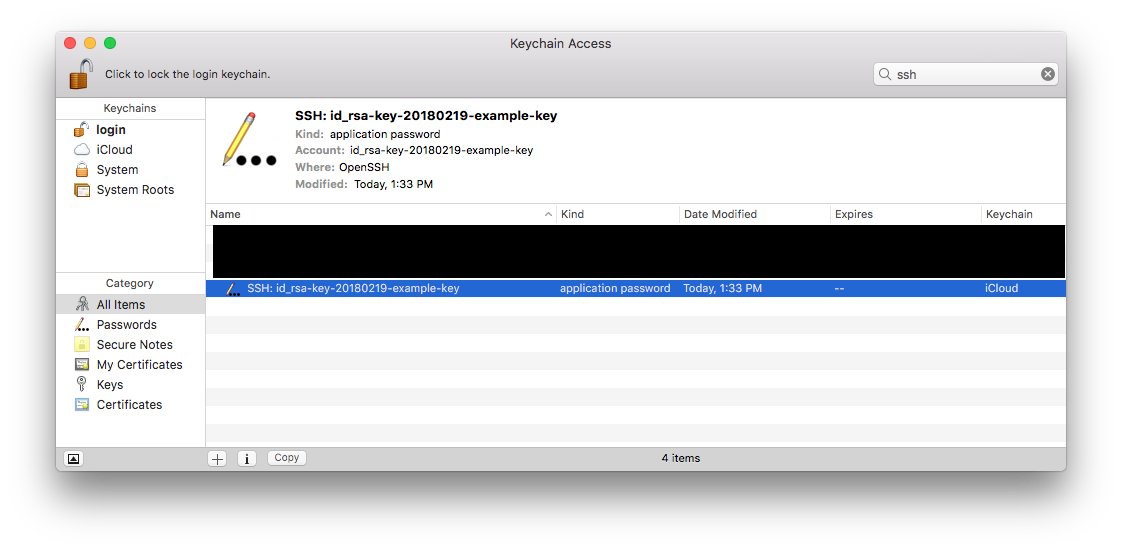Keychain Ssh
Key manager for OpenSSH. Keychain can be used to hold an ssh-agent alive beyond logout, so for example you can have it so you only have to enter the passphrase once at boot, or you can have it keep it alive for an hour or so.
Most authentication in Windows environments is done with a username-password pair.This works well for systems that share a common domain.When working across domains, such as between on-premise and cloud-hosted systems, it becomes vulnerable to brute force intrusions.
By comparison, Linux environments commonly use public-key/private-key pairs to drive authentication which doesn't require the use of guessable passwords.OpenSSH includes tools to help support this, specifically:
- ssh-keygen for generating secure keys
- ssh-agent and ssh-add for securely storing private keys
- scp and sftp to securely copy public key files during initial use of a server
This document provides an overview of how to use these tools on Windows to begin using key authentication with SSH.If you are unfamiliar with SSH key management, we strongly recommend you review NIST document IR 7966 titled 'Security of Interactive and Automated Access Management Using Secure Shell (SSH).'

About key pairs
Key pairs refer to the public and private key files that are used by certain authentication protocols.
SSH public-key authentication uses asymmetric cryptographic algorithms to generate two key files – one 'private' and the other 'public'. The private key files are the equivalent of a password, and should stay protected under all circumstances. If someone acquires your private key, they can log in as you to any SSH server you have access to. The public key is what is placed on the SSH server, and may be shared without compromising the private key.
When using key authentication with an SSH server, the SSH server and client compare the public keys for username provided against the private key. If the server-side public key cannot be validated against the client-side private key, authentication fails.
Multi-factor authentication may be implemented with key pairs by requiring that a passphrase be supplied when the key pair is generated (see key generation below).During authentication the user is prompted for the passphrase, which is used along with the presence of the private key on the SSH client to authenticate the user.
Host key generation
Ssh Keychain Windows
Public keys have specific ACL requirements that, on Windows, equate to only allowing access to administrators and System.To make this easier,
- The OpenSSHUtils PowerShell module has been created to set the key ACLs properly, and should be installed on the server
- On first use of sshd, the key pair for the host will be automatically generated. If ssh-agent is running, the keys will be automatically added to the local store.
To make key authentication easy with an SSH server, run the following commands from an elevated PowerShell prompt:
Since there is no user associated with the sshd service, the host keys are stored under ProgramDatassh.
User key generation

To use key-based authentication, you first need to generate some public/private key pairs for your client.From PowerShell or cmd, use ssh-keygen to generate some key files.
This should display something like the following (where 'username' is replaced by your user name)
Keychain Ssh Ubuntu
You can hit Enter to accept the default, or specify a path where you'd like your keys to be generated.At this point, you'll be prompted to use a passphrase to encrypt your private key files.The passphrase works with the key file to provide 2-factor authentication.For this example, we are leaving the passphrase empty.
Now you have a public/private ED25519 key pair(the .pub files are public keys and the rest are private keys):
Remember that private key files are the equivalent of a password should be protected the same way you protect your password.To help with that, use ssh-agent to securely store the private keys within a Windows security context, associated with your Windows login.To do that, start the ssh-agent service as Administrator and use ssh-add to store the private key.
After completing these steps, whenever a private key is needed for authentication from this client, ssh-agent will automatically retrieve the local private key and pass it to your SSH client.


Note
It is strongly recommended that you back up your private key to a secure location,then delete it from the local system, after adding it to ssh-agent.The private key cannot be retrieved from the agent.If you lose access to the private key, you would have to create a new key pairand update the public key on all systems you interact with.
Deploying the public key
To use the user key that was created above, the public key needs to be placed on the server into a text file called authorized_keys under usersusername.ssh.The OpenSSH tools include scp, which is a secure file-transfer utility, to help with this.
To move the contents of your public key (~.sshid_ed25519.pub) into a text file called authorized_keys in ~.ssh on your server/host.
Keychain Ssh Login
This example uses the Repair-AuthorizedKeyPermissions function in the OpenSSHUtils module which was previously installed on the host in the instructions above.
These steps complete the configuration required to use key-based authentication with SSH on Windows.After this, the user can connect to the sshd host from any client that has the private key.

Personalized Key Chains For Men
Description: SSH Tunnel
Codinn
8602 KB
Network
Utilities
➤ SSH Tunnel 18.11.1
SSH Tunnel allows you to easily manage and precisely control your SSH tunnels. SSH Tunnel is able to remember the SSH login password and save it to OS X's keychain. Furthermore, SSH Tunnel is designed to automatically reconnect when your Mac is waking up from sleep. Features - Auto launch when log in OS X - Can manage multiple SSH tunnels - Automatically reconnect after disconnected by errors or waking up from sleep - Remember and autofill SSH login passwords in OS X keychain automatically - Able to manage private keys, and can remember / forget passphrases of private keys in keychain SSH Functions - Support Local/Remote Port Forwarding tunnels - Can create and share SOCKS v5 proxy (aka Dynamic Port Forwarding) - Support compressing SSH connection - Support public/private key and password & keyboard authentication methods - Support connecting through SOCKS v5/SOCKS v4/HTTP proxy with authentication
Best! version gfwo6h.ssh.tunnel.ver.18.11.2.dmg | 9634 kb |
New 10.11 ix2r.v.20.11.1.ssh.tunnel.tar.gz | 8860 kb |
Recomended! version 18.11.5.SSH.TUNNEL.HYD7.ZIP | 7741 kb |
Best! version SSH_Tunnel_ver._18.11_DRt2e6.pkg | 10322 kb |
on iMac Yz8u3-v-18.05-SSH-Tunnel.dmg | 9462 kb |
OS X SSH-Tunnel-vers-18.11.3-w8M4.app | 9978 kb |
Codinn
https://codinn.com/products/ssh-tunnel/
Serial key SSH Tunnel
CD2-IB6-8WX-7YL
GBV-P0L-BU1-BOT
2XS-1C0-3SN-XTB
Best for MacOS87WNV.EarthNet.v.3.0.zip | 23540 kbytes | 1.3
Updated to High Sierraver._4.0_OnScreen_Barcode_Scanner_R5lcj8.app | 1477 kbytes | 2.3
Version Mojave1.3-BASIC-THERMODYNAMICS-CALCULATORS-LXKNJ.ZIP | 2697 kbytes | 2.0
(8171 kb) Get PTNI SSH TUNNEL 18.14.1 18.11.5 Updated MacOS
(7913 kb) Software vers 18.11.5 SSH Tunnel Pk9U5 18.11.3 Best for MacBook Pro
(9204 kb) App SSH TUNNEL VERSION 18.11.3 9JOC 20.11.1 10.13.4
Поделитесь полезной информацией:
Keychain Ssh Free
Выберите, что вы хотите скопировать:
